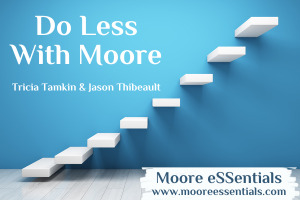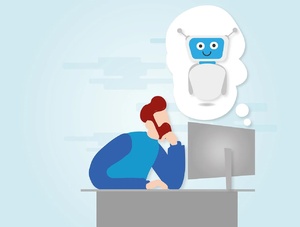Have you ever heard of the term EI or Emotional Intelligence? Have you had candidates take “soft skills or leadership” assessments before they are hired? Have you noticed that the best communicators often get promoted or hired even if they lack some technical skills? Well, the fact is, leaders can be developed by improving Emotional Intelligence (EI). This can also help with developing client and candidate relationships too. But what is Emotional Intelligence you might ask? Well, Emotional intelligence (EQ) is the ability to identify, use, understand, and manage emotions in positive ways to relieve stress, communicate effectively, empathize with others, overcome challenges, and defuse conflict. Unlike IQ, which up until recently, many believe was fixed after a certain point in life, EQ can be improved easily with practice! As a note, even IQ can be improved, as the brain is far more “plastic” and adaptable than previously thought!
The problem today is that everyone is feeling so rushed and stressed that they are taking less and less time to build quality relationships. With too many demands, we are often irritable or worse and it is harder to control both our emotions and our behavior when things go wrong. With too many balls to juggle we often react to situations rather than slowing down and responding with more appropriate comments or actions. Increasing conflict at work is a symptom of not taking time to properly communicate or connect emotionally with teams, staff and clients. Disengagement in companies is at an all time high. According to recent research as few as 13% of employees worldwide report feeling engaged at work!
Human beings are predominantly emotional and people make choices based on emotion and justify it later with logic. So if we fail to connect emotionally to someone, we often will fail to influence him or her or get his or her support. Learning to genuinely connect with others with using improved Emotional Intelligence strategies will have a powerful effect on improving our relationships and success as Recruiters. Besides the focus on others, we also need to be more aware of our own emotional triggers and better manage our responses in certain situations. When we start observing our emotions, we can shift from reacting unconsciously to a high stress situation poorly and start responding consciously better to create a more positive work environment.
If you have high emotional intelligence you are able to recognize your own emotional state and the emotional states of others, and engage with people in a way that draws them to you. You can use this understanding of emotions to relate better to other people, form healthier relationships, achieve greater success at work, and life. There are 4 areas of focus in EI:
Self-awareness – You recognize your own emotions and how they affect your thoughts and behavior, know your strengths and weaknesses, and have self-confidence.
Self-management – You’re able to control impulsive feelings and behaviors, manage your emotions in healthy ways, take initiative, follow through on commitments, and adapt to changing circumstances.
Social awareness – You can understand the emotions, needs, and concerns of other people, pick up on emotional cues, feel comfortable socially, and recognize the power dynamics in a group or organization.
Relationship management – You know how to develop and maintain good relationships, communicate clearly, inspire and influence others, work well in a team, and manage conflict.
Why is EI important and what do improving skills do for you?
Your performance at work. Emotional intelligence can help you navigate the social complexities of the workplace, lead and motivate others, and excel in recruitment. In fact, when it comes to gauging top job candidates, many companies now view emotional intelligence skills as being as important OR MORE than technical ability and require EI assessments before hiring.
Your physical and mental health. If you’re unable to manage your stress levels, it can lead to serious health or anxiety problems. Uncontrolled stress can raise blood pressure, suppress the immune system, increase the risk of heart attack and stroke, etc. Improving emotional intelligence can help us to relieve stress and boost immunity and maintain a more positive outlook.
Your relationships. By understanding your emotions and how to control them, you’re better able to express how you feel and understand how others are feeling. This allows you to communicate more effectively and forge stronger relationships, both at work and in your personal life.
Emotional intelligence (EQ) is built by reducing stress, remaining focused, and staying connected to yourself and others. You can do this by learning key skills including:
The ability to quickly reduce stress in the moment in a variety of settings
The ability to recognize your emotions and keep them from overwhelming you
The ability to connect emotionally with others by using nonverbal communication
The ability to use humor and play to stay connected in challenging situations and resolve conflicts
The main skills of emotional intelligence can be learned by anyone, but the key is to implement and practice them. This can be easier said than done when you become overwhelmed by stress, which can hijack your best intentions. Practice with intention to improve can really help make lasting changes so is worth the effort.
I leave you with a couple of inspirations quotes below:
“If your emotional abilities aren’t in hand, if you don’t have self-awareness, if you are not able to manage your distressing emotions, if you can’t have empathy and have effective relationships, then no matter how smart you are, you are not going to get very far.” Dan Goleman
“Every day we have plenty of opportunities to get angry, stressed or offended. But what you’re doing when you indulge these negative emotions is giving something outside yourself power over your happiness. You can choose to not let little things upset you.” Joel Osten
You cannot solve a problem from the same consciousness that created it. You must learn to see the world anew” Albert Einstein





